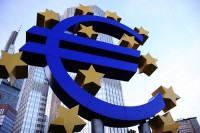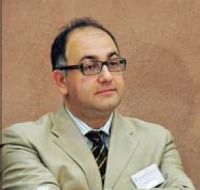These days, the Euro is under attack by speculators. We asked economists Luigino Bruni and Stefano Zamagni their opinions.
By Antonella Ferrucci
Luigino Bruni, can you tell us what is happening?
Unfortunately, what is happening shows that Europe is not yet a "community" of peoples and states. As you can see, the central banks of individual countries are by  statute last-resort lenders, that is, in the case of speculative attacks, in serious crisis of the state, they must intervene with reserves to avoid accumulative effects (just remember what happened in Italy in 1993 when Ciampi was governor of the Bank of Italy and had to resort to inflation of the Lira).
statute last-resort lenders, that is, in the case of speculative attacks, in serious crisis of the state, they must intervene with reserves to avoid accumulative effects (just remember what happened in Italy in 1993 when Ciampi was governor of the Bank of Italy and had to resort to inflation of the Lira).
The European Central Bank by statute did not want to play this role out of fear that weaker countries would abuse this function. So, faced with Greece´s crisis, instead of intervening in a timely manner as the Central Bank of a state would do in these cases, it intervened a month after mediations and compromises had been made, and this made the late rescue intervention completely ineffective. Therefore, we are now under full speculative attack with regards to the Euro without having the instruments to be able to adequately respond.
Therefore, either Europe truly becomes a community and reasons as if it were a people, or we will not get out of this crisis, and the Euro will only show as any currency does that behind monetary unity there is need of something more on the political plane and in solidarity. The Euro´s fragility is simply a picture of the political fragility of Europe, and we must act on this plane and not only on the technical and financial one.
 Do you see anything else underneath this crisis?
Do you see anything else underneath this crisis?
Of course, having said all this, it is also true that underneath this crisis there is a real problem: Western society is too much in debt, from America to Europe, and as the banks do nothing other than move the debt from one subject to another, all of this is unsustainable in the long run. This crisis will soon expand to the dollar and the sterling, and we´ll be forced into worldwide and global inflation. This will mean readjusting our consumption and lifestyle to our real income and not to swollen finance. Will we be able to overcome this moment without too much trauma? Right now, I´m doubtful, but I want to be optimistic.
Professor Zamagni, the European Union is responsible for all this...
Yes, the European Union´s responsibility in this is big, and we can attribute it to a series of omissions. The first: before the crisis, it did not think of creating a guarantee fund, something like the European Monetary Fund, to face situations like these. The second: it never created one or more European rating agencies - the agencies authorized to pass judgment on merit are all American (Standard and Poor´s, Moody´s and Fitch Ratings). The result is in front of everyone´s eyes. It´s obvious that the United States would have had interests in destabilizing the Euro, and consequently, it is obvious that the American agencies tend to spread news that has the same objective. The third omission: aver having created the ECB, the European Union never furnished the creation of a European authority interrelated to supervise real politics (not monetary). This allowed for financial unbalances to inescapably reverberate on the business world (with the loss of jobs, etc.).
What else would you like to add about the causes that brought us to today´s crisis?
That we can single out two other "errors" that produced the consequences that we see today. The first is of a technical-economic nature, and here the  economists have substantial moral responsibility because the error is in "theoretical planning". They supposed that in practice, financial risk was "exogenous" by nature, that is, that with an increase in transactions the risk would be nullified. But even a first-year economy student knows that risk is "endogenous" in nature: it increases with an increase in transactions!
economists have substantial moral responsibility because the error is in "theoretical planning". They supposed that in practice, financial risk was "exogenous" by nature, that is, that with an increase in transactions the risk would be nullified. But even a first-year economy student knows that risk is "endogenous" in nature: it increases with an increase in transactions!
The second error is of ethical nature: after having mocked ethics for years, sustaining that the economy does not need ethics lessons, (economists) realized the mistake that had been made. The risk had been transferred from banks to savers spread through the world without keeping in mind that ethical norm requires that the transfer of risk can happen only if who receives it has broad shoulders, or "broader shoulders" compared to the subject from which the risk originates. We´ve understood that what happened was the exact opposite. Banks transferred the risk to savers, even when they knew that that they would not be able to manage it. All of this together can help interpret the current situation.






